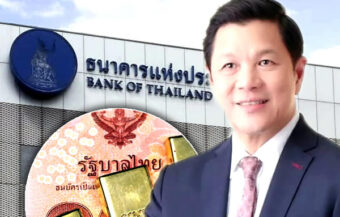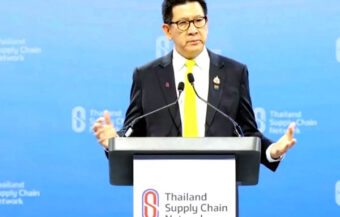Bank of Thailand’s modest rate rise will not stymie current economic growth and momentum which is moving upwards. The last rate rise still leaves levels in Thailand well behind its peers in Asia and the United States with lower borrowing and deposit rates while core inflation is growing although the rate of consumer price rises in July was just below that seen in June.
The Bank of Thailand raised interest rates for the first time since 2018 on Wednesday by 25 basis points leaving the country’s borrowers still with some of the lowest borrowing rates in the world as the government and the bank itself fear jeopardising an emerging economic recovery that could see the kingdom finally regain its equilibrium from the disastrous shutdown of 2020 by the end of this year, well behind most countries. Leading Thai banks, on Wednesday, promised to absorb the rate hike but the chief executive of Kasikorn Bank (KBank), Ms Kattiya Indaravijaya, put the government on notice that a second rate hike will be passed on to borrowers. Other concerns also remain despite booming exports and foreign tourism arrivals with CitiBank Thailand warning, this week, of a liquidity crisis worldwide towards the end of the year and unease over rising and dangerous geopolitical tensions.

The Bank of Thailand’s Monetary Policy Committee, on Wednesday, raised the kingdom’s borrowing interest rate from a historic low of 0.5% to 0.75% or an increase of twenty-five basis points.
The move came as no surprise to the market with analysts such as CitiBank in Thailand also predicting a further twenty-five-point rise when the committee meets again on September 28th and November 30th next.
Thailand’s deposit and borrowing rates significantly lower than regional peers and the United States
Even after today’s modest rate rise, the first since December 2018, the policy rate is significantly lower than Thailand’s regional peers, many of whom have already raised rates by 100 basis point up to this week and rates in the United States where an aggressive policy by the Federal Reserve has been US interest rates rise to 2.25% to 2.5% with a further rate hike of 75 basis points predicted at its next meeting in September as America’s economy displays surprising signs of resilience with recent labour data showing it added on 528,000 jobs while salaries stateside have risen by 5.2% this year.
Most analysts, including sources close to the Federal Reserve, suggest that the current barrage of strong interest rate rises in Washington will continue to the end of the year with a determination to temper inflation and a robust economy, despite a technical recession, leaving US rates at anything up to 4% by the end of the year.
Determined to preserve the economic recovery in face of a widening spread between US and Thai rates
However, Thailand’s economic planners including Sethaput Suthiwartnarueput, the governor of the Bank of Thailand and the Minister of Finance, Arkhom Termpittayapaisith agree that the kingdom should preserve its nascent economic recovery this year driven by rising numbers of foreign tourists and an even stronger performance by the country’s export sector by keeping interest rate rises lower and spread out with gradual increases.
World inflation crisis may lead Bank of Thailand to act before August and raise interest rates more sharply
Governor Sethaput and senior officials at the central bank have made it clear that the widening spread between US interest rates and Thai rates has not seen capital flight out of the kingdom which in the last 12 months has seen an inflow while arguing that the striking 10% depreciation of the baht witnessed up to July 21st last was as low as the Thai currency would go with the market already factoring in the prospects of a further divergence between Thai and US interest rates.
This has been subsequently validated by the market with the baht gaining strongly since the end of July by nearly 4% from ฿36.73 on July 21st to ฿35.27 after Wednesday’s rate hike was announced.
The question is what effects a projected divergence of 2.75% will have on markets compared to a current rate of 1.5% after today’s announcement?
Exporters predict a 10% gain this year, helping to support the country’s current account and the baht
Thai exporters who achieved a 12.1% growth in the first six months of 2022 have predicted a further 7% gain in the second half of this year, according to Chaichan Chareonsuk, the chairman of the Thai National Shippers’ Council with an annual gain projected for 2022 of up to 10%.
This is predicated on the baht holding at a level of between $34 to ฿3 to the US dollar.
There is some evidence that Thailand’s central bank, like others in Asia, has intervened in recent months to halt the slide of the currency before its sudden recovery at the end of July with Thailand’s foreign exchange reserves falling by $42.7 billion from $256.8 billion on February 5th this year to $215.8 billion on the 22nd July last before rising again to $220 billion on the 5th of August.
The rise in exports should help support the country’s current account deficit which appeared to peak in May at $3.71 billion before falling to $1.87 billion in June with the situation expected to improve as the economic recovery kicks into gear driven by exports and foreign tourism income.
This, in turn, will help prop up the baht.
Citibank warns of a tightening of liquidity worldwide later this year feeding into Thailand’s markets
However, some concerns do remain such as an expected credit crunch or tightening of liquidity worldwide impacting export and tourism markets in the latter half of this year.
In recent days, Mr Ken Pang, the Asia Pacific strategist for Citibank, warned that higher inflation, particularly higher energy costs, will impact the world economy, especially in developed markets.
There are a range of factors not least the Russian Ukraine War but also new green taxes in the United Kingdom as well as supply chain issues linked with China including chronic problems in the Communist country despite talk from officials there of an effort to galvanise its economy in the months ahead.
In the United States, while the economy has shown staying power, there is also some evidence that consumer confidence is being damaged by rising prices which are increasingly now being driven by core inflation.
Higher consumer price index, while easing slightly, is now consistent while core inflation is on the rise
This could also be an issue for Thailand where consumer prices in July rose by 7.61 %, only slightly moderated from 7.66% in June but with confirmation this week from the Ministry of Commerce that elevated inflation will now continue until the end of the year in Thailand.
This was noted on Wednesday by the Monetary Policy Committee which also observed that a continuation of the high trend in monthly inflation figures was now creeping its way into the country’s core inflation rate which came in at nearly 3% in July and is heading north.
The Bank of Thailand and other bodies such as the Thai Bankers’ Association have also, this week, expressed apprehension about vulnerable households and in particular small business concerns who are not benefiting from the economic recovery underway in the kingdom after the devastation caused by the shutdown of the economy in 2020.
Slow recovery with the most vulnerable still left behind because of the unequal nature of the economy
The World Bank, in July, while noting Thailand’s slow recovery from that period of contraction, pointed out the growth levels projected in 2023 and 2024 at 3.9% and 4.3% are better than growth levels seen before the pandemic.
Thailand with its enviable level of foreign currency reserves and a well-capitalised banking sector which has been ably managed and overseen by the Bank of Thailand has managed to preserve the kingdom’s stability while its large firms as well as a growing number of businesses and households in the tourism, farming and export sectors, are currently experiencing higher levels of income.
However, while financial liquidity is strong within the system, it is not equally distributed as is the case with more developed economies.
Debt relief schemes organised by the central bank have played a critical role since the 2020 downturn but some homes and small businesses still need help
The central bank initiated debt relief measures and a programme in 2020, at the height of the crisis and a massive downturn in the economy which saw 6.1 million customers with a total debt level of ฿4.2 trillion receiving assistance.
By May this year, the number of people participating in the programme had fallen to 1.6 million borrowers with a total debt of ฿2 trillion.
On Wednesday, the President of the Federation of Thai SMEs, Sangchai Theerakulwanich, expressed concern at the upward movement in interest rates in Thailand and called for help to be directed at small to medium-scale enterprises that have high debt levels and for whom the rate increase is another burden coming at a time of higher inflation.
However, most of the commercial banks in Thailand including Kasikornbank (KBank), Siam Commercial Bank and Bangkok Bank all suggested that they would try to accommodate their customers with a similar commitment coming from the Thai Bankers’ Association.
Top bankers say Wednesday’s rate rise will not be passed on but Kasikornbank (KBank) boss Kattiya Indaravijaya makes it clear that a second rate rise will
Mr Chatchai Sirilai, the Managing Director of the kingdom’s Government Housing Bank or GH Bank, a key mortgage provider and supporter of small business borrowers in Thailand, which has outstanding loans of ฿1.52 trillion, stressed that borrowers will have some time to adjust to the modest rise in interest rates with plans by his bank not to pass on the rate increase immediately to existing borrowers but, at the same time, to offer higher deposit rates from this week in line with the Monetary Policy Committee decision to raise rates.
He predicted that increased rates on loans will not be imposed on customers until the end of 2022. He also pointed out that most of the bank’s customers had loan packages with fixed rates built-in and were protected from the current situation.
The chief executive of Kasikornbank (KBank), Ms Kattiya Indaravijaya clarified that her bank, one of Thailand’s largest with 887 branches and ฿3.3 trillion in assets with its roots in farming, would not pass on Wednesday’s rate rise to its customers.
However, she made it clear that a second rate rise, which is predicted by most analysts in September, will see extra charges, where applicable, passed on to borrowers.
‘We can hold the interest rates unchanged until the policy rate rises two times during the rest of the year. The bank wants to support borrowers to avoid hardship amid the gradual rebound of the Thai economy. But if the Bank of Thailand hikes the policy rate by two times, we will follow the rate hike by raising both our deposit and loan rates,’ the top banker explained.
Bank of Thailand boss suggested that 60% of loans are already on a fixed interest rate while only half of any rate rise will impact borrowers this year
Bank of Thailand Governor Sethaput Suthiwartnarueput estimated in the last week that only half of the projected interest rate rises to be announced by the central bank by the end of the year would be passed on to customers.
He suggested that, even then, up to 60% had loans negotiated at fixed rates.
On Wednesday, the bank revealed that by the end of this year, the kingdom’s economy may have recovered to the level seen before the pandemic, which seems somewhat optimistic given the 6.1% contraction seen in 2020 and growth of only 1.6% last year.
Thai economy in an upswing with over 1 million foreign tourists in July powering higher GDP gains
However, with the economy on an upswing with rising foreign tourism numbers, farm and household incomes as well the continued success of Thailand’s exports abroad, there is the potential for higher than expected economic growth in 2022.
Danger remains, watch out for geopolitical tensions
Last week, the Thai Prime Minister predicted a growth in GDP of 3.3% for 2022.
However, based on the figures seen so far in 2022 and with over 1 million foreign tourists arriving every month, this could climb to between 4 and 5% or even higher.
On the other hand, in the last few days, CitiBank Thailand predicted a GDP growth figure of 3.5% for the year, a downgrade.
It warns of headwinds caused by the external macroeconomic environment in the world economy and also from a far more dangerous geopolitical situation particularly due to disturbing differences between the United States and China over Taiwan with unprecedented exchanges coming from Beijing and Washington DC over the last week in addition to the unpredictable nature of the ongoing Russian Ukraine war.
Join the Thai News forum, follow Thai Examiner on Facebook here
Receive all our stories as they come out on Telegram here
Follow Thai Examiner here
Further reading:
Central bank reassurances as ex-minister raises loan quality with China’s economy in trouble
Concern for the Thai baht and liquidity if Thailand does not move swiftly to raise interest rates
Thai bond yields spike 20% as kingdom adopts a confident, pro growth pose amid capital flight
Prolonged Ukraine war to see Thai inflation at 6.3%, a stalled economy and a possible downgrade
Travel sector calls for endemic status, scrapping of Thailand Pass and full normality on entry
Fears for Thailand’s economy over Ukraine war with rising inflation rates and loss of confidence
Thailand should move more towards a circular economy as the country faces intractable hurdles
Thailand’s economy awaits the fallout from the Omicron surge as projections for 2022 take a dive
Inflationary fears for Thailand more muted than in the United States but planners should prepare
A cautious recovery in 2022 says Bank of Thailand boss but PM strikes a mildy more optimistic note
With Omicron hovering, firms already suffering a cash flow crunch with the economy again in peril
Shaky economic recovery as planners target only a 1% gain in 2021 with rising headwinds in Quarter 4
Economy climbing out ‘of a hole’, foreign firm’s confidence levels rose sharply during October
Another GDP contraction looms as Thailand tries to boost its economic fortunes by spending more
Rising prospect of GDP contraction for 2021 may see government breach the legal public debt limit
Economic fears rising as Thailand faces a bigger crisis than 1997 with rising job losses and debt
Central bank to lower GDP growth forecast as its attention turns to private sector debt management
Loan bill passes but Thai economic prospects are not bright with a 1.8% 2021 GDP gain predicted
IMF urges government to loosen nation’s purse strings as finances tighten with the tax take down
Failure to pass the ฿500 billion borrowing decree could lead to the dissolution of parliament
Industry leaders and central bank all warn that foreign tourism must return to avoid a collapse
Desperate foreign tourism business concerns are clinging to straws as they try to survive the crisis
Strengthening baht predicted as investors bet on a reopening of Thailand to mass tourism in 2021
Thailand facing a credit crunch as 3rd virus wave craters the kingdom’s economic recovery plans
Reopening of Phuket still not officially approved although it is the ideal test for a broader move
Economy to rebound as the year progresses driven by exports and a return of mass foreign tourism
Door closing on quick foreign tourism return as economic recovery is delayed to the end of 2022
Fact – only 6,556 visitors arrived in Thailand last month compared to 3.95 million in December 2019


















